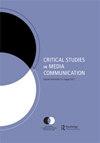他们玩
IF 1.5
2区 文学
Q3 COMMUNICATION
引用次数: 3
摘要
在过去的五年里,Mukherjee, S. (2018.)玩低级游戏:电子游戏和后殖民主义。游戏与文化,13(5),504-520)。文化游戏中的后殖民游戏研究。人文开放图书馆,4(1),1 - 25)(除其他外)学期后殖民游戏研究。后殖民游戏研究着眼于游戏如何在故事世界中呈现殖民和后殖民环境,并考虑后殖民国家的玩家如何消费这些游戏。恰当地说,这是对游戏如何复制殖民比喻的一种批判。在这篇文章中,我认为去殖民化游戏的工作要求我们也去殖民化游戏。在这里,我想说的是,游戏学术所依据的基本理论是建立在种族主义和仇外的二元对立之上的,即文明与野蛮的对立。这种二元对立是欧洲白人游戏研究学术经典的结果,该经典支持一种仅通过客观视角来理解的宏大游戏理论。如果我们要考虑游戏研究的未来,我认为我们应该努力去殖民化游戏。至关重要的是,我们必须关注黑人、原住民和有色人种(BIPOC)是如何在全球范围内发挥作用的,并考虑到这种发挥作用的许多其他方式(不仅仅是游戏)。本文章由计算机程序翻译,如有差异,请以英文原文为准。
Decolonizing play
ABSTRACT The past five years have seen the development of what Mukherjee, S. (2018. Playing subaltern: Video games and postcolonialism. Games and Culture, 13(5), 504–520) and Murray, S. (2018. The work of postcolonial game studies in the play of culture. Open Library of Humanities, 4(1), 1–25) (amongst others) term postcolonial game studies. Postcolonial game studies looks at how games represent colonial and postcolonial environments in the story worlds they present, and also considers how these games are consumed by players in postcolonial nations. Fittingly, it is a critique both of how games reproduce colonial tropes. In this essay, I argue that the work of decolonizing games requires that we also decolonize play. Here I shall argue that the foundational theories of play that game scholarship is predicated upon are built upon a racist and xenophobic binary that pits civilization against barbarism. This binary is a consequence of a white European canon of game studies scholarship that has supported a grand theory of play apprehended only through an etic lens. If we are to consider the future of game studies, I think we should work to decolonize play. Crucially, we must attend to how Black, Indigenous, and people of color (BIPOC) play globally and consider the many other ways—beyond merely games—that this play is articulated.
求助全文
通过发布文献求助,成功后即可免费获取论文全文。
去求助
来源期刊

Critical Studies in Media Communication
COMMUNICATION-
CiteScore
2.10
自引率
0.00%
发文量
34
期刊介绍:
Critical Studies in Media Communication (CSMC) is a peer-reviewed publication of the National Communication Association. CSMC publishes original scholarship in mediated and mass communication from a cultural studies and/or critical perspective. It particularly welcomes submissions that enrich debates among various critical traditions, methodological and analytical approaches, and theoretical standpoints. CSMC takes an inclusive view of media and welcomes scholarship on topics such as • media audiences • representations • institutions • digital technologies • social media • gaming • professional practices and ethics • production studies • media history • political economy. CSMC publishes scholarship about media audiences, representations, institutions, technologies, and professional practices. It includes work in history, political economy, critical philosophy, race and feminist theorizing, rhetorical and media criticism, and literary theory. It takes an inclusive view of media, including newspapers, magazines and other forms of print, cable, radio, television, film, and new media technologies such as the Internet.
 求助内容:
求助内容: 应助结果提醒方式:
应助结果提醒方式:


